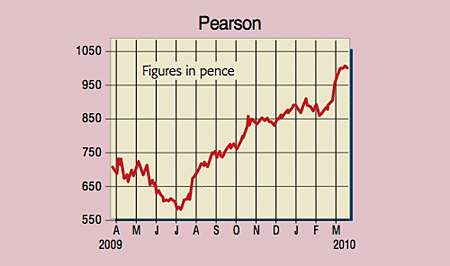
Everyone seems to love momentum stocks that pay dividends and have lots of overseas exposure to protect them against further sterling declines. But I’m not convinced. It is far more important to assess each firm on its own merits, regularly comparing its market value with the stock’s intrinsic worth. Then, when a share becomes overvalued, you lock in profits and recycle the proceeds into other more attractive opportunities.
So what of Pearson, a firm whose shares trade at near eight-year highs? Along with owning the Financial Times (15% of sales) and Penguin Books (18%), this global publisher also runs an education division (67%) that offers school, student and professional literature, plus exam services. Historically, this division has been resilient in downturns because it tends to outperform when job prospects are poor (more undergraduates sign up to do doctorates while the unemployed seek to retrain).
Indeed, despite the difficult economic backdrop, Pearson reported decent organic top-line growth of 4% in 2009. That drove earnings per share (EPS) up 13% to 65.4p and lifted the dividend by 5% to 35.5p. This performance triggered a slew of analyst upgrades, with the City now pencilling in estimates of 2010 revenues and underlying Ebita of £5.8bn and £895m respectively. These rise to £6.0bn and £950m in 2011. That puts the stock on enterprise value/Ebita multiples of 10.5 and 10.0, after deducting net debt of £1.1bn and adjusting for the £339m pension deficit.
Pearson (LSE: PSON), rated a BUY by Jefferies
This stretched rating may not yet put it in bubble territory. But it isn’t cheap, given the weak state of the newspaper advertising and consumer book markets, where sales of printed publications are being cannibalised by online content. Worse still, if there is another leg down in these areas, it will coincide with the group ramping up its digital infrastructure. That will squeeze its 15% margins.
Finally, Pearson is heavily exposed to struggling state education budgets in America, where it has approximately a 37% share of the US schools textbook market. Indeed, there has already been some political showboating in California, which plans to phase-out expensive learning materials and replace them with cheaper web alternatives. Given my 760p per share fair value for the stock is over 20% below today’s level, it’s time to take profits. The next trading statement is scheduled for 30 April.
Recommendation: TAKE PROFITS at £10.00
• Paul Hill also writes a weekly share-tipping newsletter,